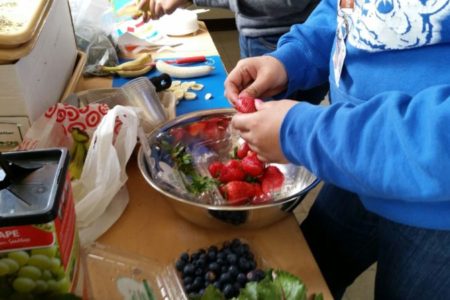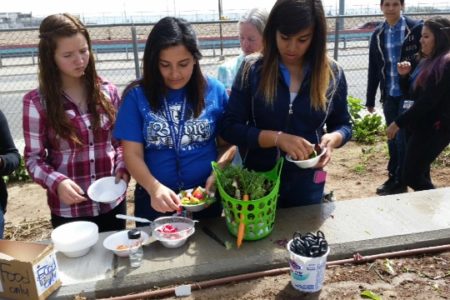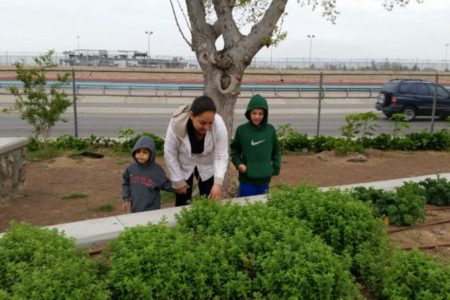Share On Social!
El Paso, Texas has come a long way since ranked as the third-fattest U.S. city in 2012. A renewed focus on eating healthy and moving more is paying off; obesity rates in the area are dropping. In addition to local health departments and community organizations, schools are playing a big role in these changes by addressing health, culture and community all at once. At Bowie High School, students are getting exposed not only to gardening, nutrition education and business skills, they are reconnecting with cultural traditions that favor fresh and flavorful over processed and sugary.
EMERGENCE
Awareness/Learn: The city of El Paso, Texas, shares its border with Mexico.

This creates an interesting cultural dynamic where some students cross the border daily from Mexico to go to Bowie High School in El Paso, said Ana Suffle, who has taught at Bowie for 15 years.
Many families in the area, she said, struggle financially and with their health.
“Parents, the grandparents…they have lost their culture,” Suffle said.
She blames cheap fast-food for high rates of childhood obesity and adult diabetes in El Paso.
“They take a bite [of junk food] and it’s almost addictive to them,” Suffle said.
She thinks back to traditional Hispanic dishes filled with fresh vegetables, aromatic spices and tons of flavor.
“The kids don’t know about nopales, they’ve seen them they’ve heard about them, but they don’t really know what they are.”
Frame Issue: In 2012, administrators at Bowie were looking for a way to revamp the school’s reputation and do something positive for students and their community.
Student leaders at Bowie noticed a large empty space on school grounds.
What about a school garden there, they thought?
But without proper funding, attention, and a solid plan, the garden dream was put on hold.
DEVELOPMENT

Education/Mobilization:About two years later, however, the idea got a second wind thanks to renewed student interest in the unused space.
School administrators brought the idea to former state Sen. Eliot Shapleigh. As a prominent local figure passionate about health, education and agriculture, Shapleigh envisioned how the garden at Bowie could be more than just a garden.
As an El Paso native, he understood the culture and the struggle families face to eat healthy.
“It’s much easier to get on the preventative end rather than 45 years later,” he said.
He echoed Suffle’s concern about kids in the region—kids grabbing soda and junk at the convenience store and being out-of-touch with the healthy Mesoamerican traditional foods of the region.
Shapleigh wanted to help move the garden idea forward.
In January 2014, the school held a town hall to discuss forming a garden and educational program.
They determined the program would focus on three foundational elements: culinary teaching, gardening and business training.
Eventually referred to as “El Jardin, La Cocina y El Mercado de la Communidad de la Bowie”, the idea was to teach students about how to prepare healthy traditional food like nopales, how to farm and grow plants like their ancestors, and how to learn business skills by selling their produce at their own farmers’ market.
Debate: As plans started moving forward, Shapleigh said they ran into an unexpected but familiar problem.
“Water. You’ve got to have water.”
Water access is something the El Paso region struggles with regularly.
And now a school needs extra for a garden?
Shapleigh met with the local water service provider and asked if they would be willing to provide water free of charge to school gardens participating in the new program. In exchange, he said the schools would commit to showing data that the program was impactful. The water service provider said Bowie needed to install meters in the garden to track how much water was being used, so that they wouldn’t accidently cover water that was used to water something unrelated, like the football field.
This could be done, said Shapleigh, but water meters aren’t cheap. He was able to help, but the garden project would need more funds if they were going to install meters along with raised beds, irrigation and buy all the seeds and tools necessary to run a successful garden.
ENACTMENT

Activation/Frame Policy: As folks began learning about the garden efforts at Bowie, more people wanted to help.
A large number of Bowie alumni and community members began donating funds. These resources allowed Bowie to turn their dream of a modest school garden into what many would begin to call “a small urban farm.”
Garden construction and initial planting began in Spring 2014.
But once summer hit and students were on vacation, up-keep was harder.
Suffle, still just a teacher at the time, worried all the hard work in the Spring would go to waste.
“By the time everybody comes back from vacation, there won’t be any garden left,” she said.
Not willing to give the garden to the weeds, Suffle tended to the garden almost every day in the summer. She said she found it very relaxing and truly enjoyed her time in the dirt.
This made it was clear a full-time gardener was needed to maximize the garden’s benefits.

Change: Suffle was hired as the full-time garden coordinator in fall 2014 thanks to a grant from the Paso del Norte Foundation and support from La Semilla Food Center.
Bowie also got evaluation help from La Semilla to track garden usage, food safety, and use its Edible Education curriculum, said Rebecca Wiggins-Reinhard, co-founder of La Semilla and the director of farm-to-school activities.
Bowie also recruited help from University of Texas at El Paso business students to serve as mentors to the high school students interested in selling garden produce at the Mercado.
By Spring 2015, the garden at Bowie was bursting with ripe produce. Beets, jalapenos, prickly pear, squash, beans, corn and more are sprouting up in abundance.
And not all the goods are in raised beds.
Trees like pomegranate and fig bear delicious fruit, no added-sugar needed.
“It’s basically an orchard over there,” Shapleigh said.
Teachers are incorporating the garden into lessons on all subjects, like math and English.
“Sometimes the English class will come out here and do vocabulary,” Suffle said.
In March, students held their first Mercado where they put what they learned from the UTEP business students into practice. They were successful, to say the least.
“In an hour and a half everything was sold,” Suffle said.
IMPLEMENTATION

Implementation: With tremendous support from Bowie teachers, administration and the community, students are learning that what goes into their body doesn’t have to come in a plastic wrapper.
“This is one of the first sites where it is really becoming integrated into the school community and curriculum,” said Wiggins-Reinhard.
“We are 100% committed to the garden,” Suffle said.
Bowie’s garden program continues to progress, serving as a model for other schools and school districts, said Shapleigh.
“We’re showing kids how to use the vegetables in a creative way and giving them alternatives to grabbing a bag of potato chips or candy,” said Sam Attel, student activities manager at Bowie and another big champion of the school’s garden program.
The school district has also partnered with the medical school in El Paso to provide opportunities for medical students to earn credit by aiding nutrition education at schools. Shapleigh and the medical community see the partnership as an innovative collaboration that will greatly influence preventative care and help the border regions get and stay healthy.
Equity: The benefits from the garden aren’t only for the students.
“Even us teachers have to reintroduce ourselves to healthy eating from the garden,” Suffle said.
She said teachers welcome the new “garden culture” and are learning more about nutrition and gardening themselves.
By shopping at the Mercado, the El Paso community also benefits, buying freshly grown healthy food that supports Bowie’s efforts to create a healthier, more sustainable generation.
Sustainability: Suffle said other local schools have asked for the Bowie garden farmers’ market to set up on their campuses during their lunch.
In fact, Shapleigh has moved on to assist other local schools in setting up garden programs of their own. An aquaculture project at Irvin High School is in the works, he said.
Wiggins-Reinhard said that Bowie is in the process of fully integrating the garden into academics. The assistant principal along with the local AgriLife extension are creating a curriculum that would have students take classes that incorporate the garden program starting their freshman year all the way to senior year. By then, a student would have the experience of growing, cooking and selling their own food.
According to Shapleigh, to enhance nutrition education, Texas Tech Health Science Center El Paso will train the first cohort of science, math and biology teachers from El Paso Independent School District starting in July 2015. Then, Tech students plan to host Carnaval de Salud at Bowie and Irvin to educate students on life-long health habits aimed especially at combating diabetes.
Suffle said she has seen students amazed at where vegetables really come from, and she hopes the learning will continue to impact the El Paso community for generations.
“It’s never ending, and it’s beautiful.”
This success story was produced by Salud America! with support from the Robert Wood Johnson Foundation. The stories are intended for educational and informative purposes. References to specific policymakers, individuals, schools, policies, or companies have been included solely to advance these purposes and do not constitute an endorsement, sponsorship, or recommendation. Stories are based on and told by real community members and are the opinions and views of the individuals whose stories are told. Organization and activities described were not supported by Salud America! or the Robert Wood Johnson Foundation and do not necessarily represent the views of Salud America! or the Robert Wood Johnson Foundation.
ABOUT THE PROGRAM
Salud America! The RWJF Research Network to Prevent Obesity Among Latino Children is a national program of the Robert Wood Johnson Foundation. The program aims to educate researchers, decision-makers, community leaders, and the public in contributing toward healthier Latino communities and seeking environmental and policy solutions to the epidemic of Latino childhood obesity. The network is directed by the Institute for Health Promotion Research at the University of Texas Health Science Center at San Antonio.
For more information, visit http://www.salud-america.org.
By The Numbers
142
Percent
Expected rise in Latino cancer cases in coming years
This success story was produced by Salud America! with support from the Robert Wood Johnson Foundation.
The stories are intended for educational and informative purposes. References to specific policymakers, individuals, schools, policies, or companies have been included solely to advance these purposes and do not constitute an endorsement, sponsorship, or recommendation. Stories are based on and told by real community members and are the opinions and views of the individuals whose stories are told. Organization and activities described were not supported by Salud America! or the Robert Wood Johnson Foundation and do not necessarily represent the views of Salud America! or the Robert Wood Johnson Foundation.



